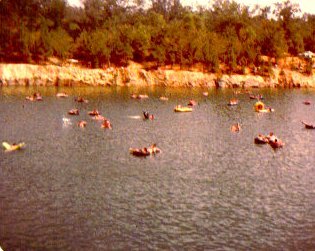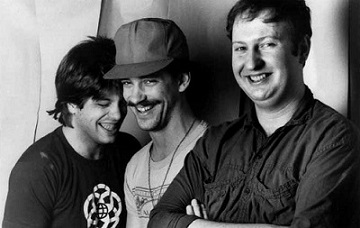I was lying on a raft in the cool, crystal blue waters of Sugar Lake, a rock quarry near Chapel Hill, North Carolina, beer in one hand and cigarette in the other. On the shore was a boombox blasting Hüsker Dü’s brand new album, Candy Apple Grey, at full distortion. I loved Hüsker Dü. I loved singer and guitarist Bob Mould. And at that moment, I really, really loved drummer Grant Hart’s song “I Don’t Want to Know if You Are Lonely.”
The year was 1986. I was restless, irritable, and discontent — a rookie newspaper reporter covering the small-town cop beat in nearby Burlington, and writing a little music column on the side, in which I’d wax lovingly about regional bands like Let’s Active and R.E.M. Every once in a while, I’d sneak in mentions of the post-punk bands on SST Records that I liked: Black Flag, Meat Puppets, Sonic Youth, Minutemen, and Hüsker Dü. The latter two I liked the most.
So on that hot afternoon at Sugar Lake, I hatched a plan: I would go to New York City, job or no job, and pursue my dream of writing about punk rock and hip-hop for big national music magazines. I had caught a Hüsker Dü show a few months earlier in Chapel Hill when my friend Eddie gave me tickets to see them, and I desperately wanted to write about them. But I couldn’t. Not in a small-town daily newspaper. I had to write about murders, rapes, and racist government officials, and maybe pen the occasional concert review or local band profile.
When I got back home from Sugar Lake, I did some research and found out about a publishing program at New York University. I applied, took a leave of absence from the paper, and left for New York, never intending to return. It would be a few more years before my name would begin to appear in Option, Rolling Stone, and then on MTV, but that day on the lake was the beginning of the journey. Within a year, I had graduated from checking local arrest records to writing about punk bands and sitting in recording studios with rap groups like Stetsasonic and Public Enemy.
At some point after I arrived in New York, I bought tickets to see Hüsker Dü again. This time they were scheduled to play an acoustic set (pretty unheard of for a punk band in the pre-MTV Unplugged years) on a bill with Debbie Harry and Chris Stein of Blondie, art rocker Laurie Anderson, avant-garde composer Philip Glass, and Beat literary legend Williams S. Burroughs. It was for an AIDS benefit organized by the John Giorno Poetry Project. But just days before the show, Hüsker Dü broke up while on the road, the victim of substance abuse and infighting. I was devastated. They were part of the reason I was in New York in the first place, and the main reason that I wanted to see that show.
Within another handful of years, I had moved on to Los Angeles to edit Option, where I finally got a chance to write a cover story on Mould and Dead Kennedys frontman Jello Biafra. The title of the piece was “Whither Punk,” but in the office we referred to it as the “Jello Mould” story. In it, Mould talked to me about Hüsker Dü’s breakup, about addiction, about his years on the road with Hart and the trio’s bassist, Greg Norton. It was the first story I wrote as editor of the magazine, and it was a dream come true, although at the time I was way too cool to admit that.
I never got a chance to write about Grant Hart.
And now, 31 years after that pivotal day at Sugar Lake, Grant is dead, at 56, a year younger than I am right now. His death, of cancer exacerbated by Hep C, is a direct result of his lifestyle. Like a lot of us from that era of American independent rock, Hart lived a hard, self-destructive life. But he gave us so much to love. Between him and Mould, Hüsker Dü took what was called hardcore punk and turned it into sublimely melodic rock that was different from anything that had come before. Much of that was due to Hart’s glorious ear for melody. They took the Byrds’ nervous, free jazz-like arrangement of “Eight Miles High” and transformed it, making lyrics from the hippie ’60s resonate for punk fans in the ’80s.
“Nowhere is / There warmth to be found / Among those afraid of losing their ground,” Mould raged in “Eight Miles High,” over a railroad roar of guitars, his vocals not even pronouncing all of the words. And yet he charged on: “Rain gray town / Known for its sound / In places, small faces unbound.”
The prickly rush of emotion in Mould’s songs and the pop hooks in Hart’s inspired a teenaged Kurt Cobain to pick up a guitar and screech out a new kind of punk rock with Nirvana. In fact, if it weren’t for Hüsker Dü’s move to a major label in the late ’80s, there may never have been a Nirvana or a Green Day, and certainly not the spate of post-punk bands that followed and found massive audiences and much more success than any of us could have dreamed of for scrappy punk bands that wailed over walls of noisy guitars.
Bob Mould and Grant Hart helped pave the way for rock’s new day rising, not to mention for music journalists like me. And today, I think back on the Grant Hart song that mesmerized me so many decades ago as I floated on a raft on Sugar Lake, dreaming of my future. Thanks, Bob and Grant and Greg. You didn’t make life easy for me, but you sure made it rewarding.
Here’s Grant four years ago, looking frail and playing his song “Is the Sky the Limit?” Is it? Maybe. But then, maybe it’s not.


Thanks for this post, Mark… Hüsker Dü got me through some of the toughest times in my life and they’ll always have a chunk of my heart. I’d love to read the piece you wrote for Option on Bob Mould if possible, lemme know. Thanks again!
Hey Emily. Thanks for your comments. I’m glad the piece resonated for you. Maybe I’ll post that old Bob Mould story on this site some day. I’ll let you know when I do.